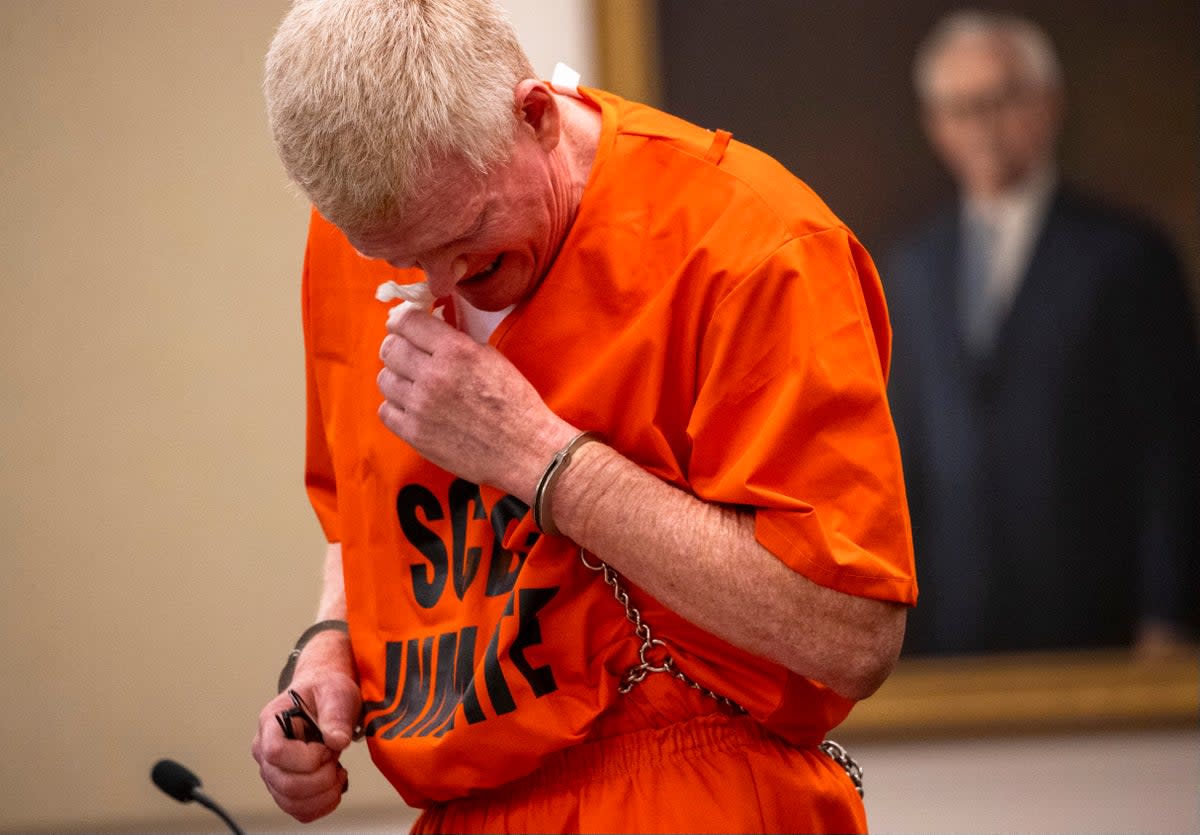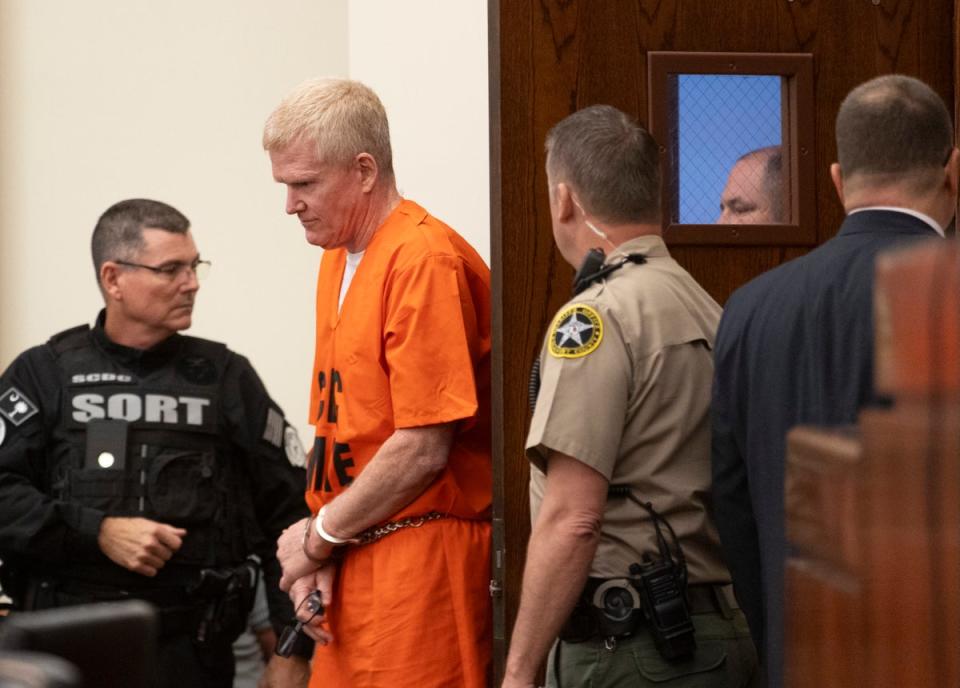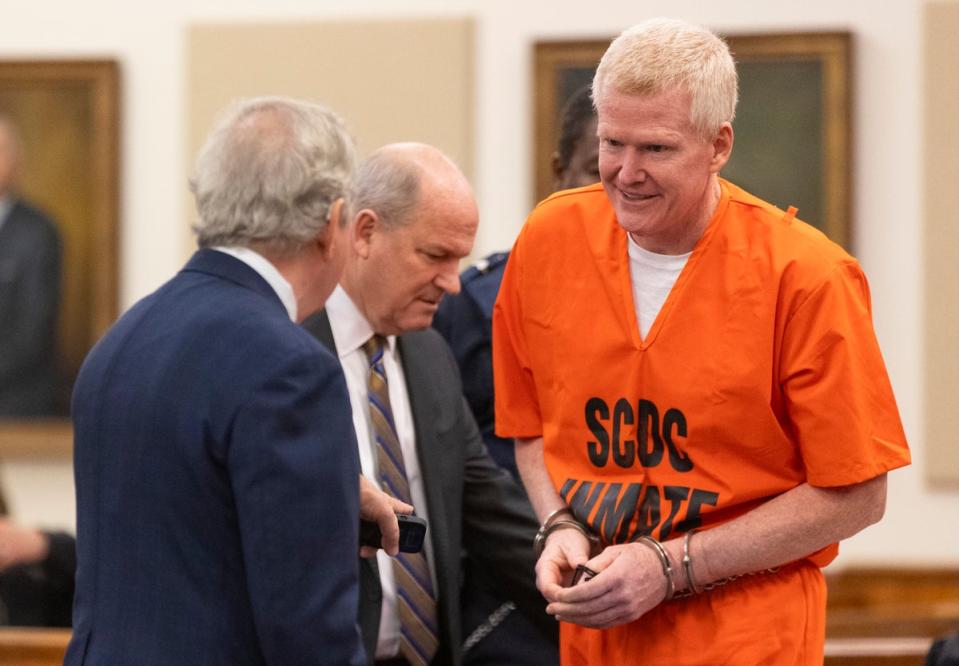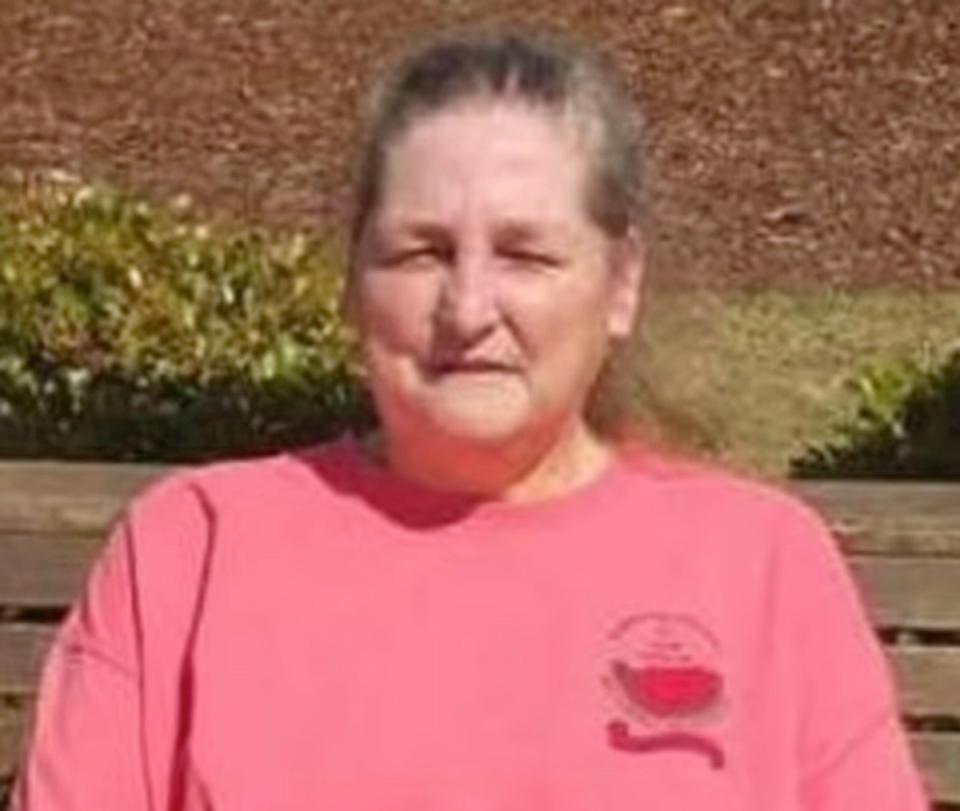Sobbing Alex Murdaugh makes himself the victim at fraud trial sentencing

Sobbing Alex Murdaugh apologised to the multiple victims that he stole millions of dollars from in their hours of need during an emotional sentencing hearing – before using the floor to once again deny all responsibility for the murders of his wife Maggie and son Paul.
What began as a statement apologising for his financial fraud crimes inside the courtroom in Beaufort County on Tuesday descended into a monologue where he hit out at the South Carolina Law Enforcement Division and the South Carolina Attorney General’s Office for their handling of the murder investigation.
Despite the overwhelming evidence presented at his murder trial, Murdaugh claimed that the state had only honed in on him for the 7 June 2021 slayings because of his other criminal activity.
“I now ask every single person who cares about Maggie and about Paul, as I know that the things that I did and that I’m pleading guilty to today allowed SLED and the Attorney General’s office to focus on me – and not to pursue the person or the people who hurt and killed Maggie and Paw Paw,” he said.
The disgraced legal scion – who was exposed for lying about his alibi on the night of his loved ones’ murders – also went on to blame the few crimes he has admitted to on his apparent opioid addiction.
“After hours, weeks, days months of self-reflection, I took more and more pills because I was hiding – attempting to hide – from the reality of the things that I was doing to all of you,” he said.
Going on to say he was now “812 days clean” from what he has previously described as a two-decade-long opioid addiction, he urged people with addiction issues to seek help.

“Anyone show suffers from addiction, get professional help. Don’t let pride get in the way like I did,” he said.
At his double murder trial, the disgraced attorney claimed he was spending up to $60,000 a week on pills at the height of his opioid habit.
But, the true extent of Murdaugh’s addiction has been doubted by state prosecutors – who question where a significant amount of the stolen money really went.
For more than a decade, Murdaugh stole over $12.4m in funds from several clients at his law firm PMPED in a multi-million-dollar fraud scheme which went on at least from 2008 through 2021 when he was caught.
As part of the scheme, Murdaugh worked with his co-conspirators and friends ex-attorney Cory Fleming and ex-Palmetto State Bank CEO Russell Laffitte to swindle clients out of millions of dollars.
The attorneys would represent the victims in wrongful death suits, with Laffitte and Fleming sometimes acting as conservators to the victims – before the men pocketed the money for themselves.
Much of the stolen money was funneled through a fake “Forge” bank account which sought to imitate the legitimate and totally unrelated business Forge Consulting.
Some of the money was also channeled through checks cut to Curtis “Cousin Eddie” Smith – Murdaugh’s distant cousin and alleged drug dealer who also happens to be the alleged accomplice in the killer’s bizarre botched hitman plot.
After he pleaded guilty in a plea deal earlier this month, the state and defence asked the judge to hand down a 27-year sentence.

Judge Clifton Newman complied, telling Murdaugh: “You’re quite an enigma – a person many of us thought we knew. You’re an enigmatic person. I don’t know that you understand yourself.”
The judge recalled only one other time where he was presiding over a capital punishment case and the perpetrator “heartless” and “empty”.
“You come closest to that young man,” he told Murdaugh.
“Being empty, I don’t see anything. I tried to reach you at sentencing in the other case. I listened to you today and I don’t see anything in you. Hopefully something will emerge in your spirit, in your soul.”
During his rambling, lengthy statement in court on Tuesday, Murdaugh also hit out at the rampant speculation about his son Buster and the unsolved 2015 death of a gay teenager – and sought to downplay the role that the family’s late housekeeper of 20 years had played in his children’s upbringings.
The convicted killer and fraudster began the statement by addressing the victims of his decade-long multi-million-dollar fraud scheme, claiming that he “hates the things that I did” to them.
“Each of you that spoke, I listened to you, I heard you – your pain and the hurt is palpable,” he insisted.
“I get it. It’s reasonable and I promise you that it resonates with me. I hope that the time will come when you can look back and know that, despite the things I did, that I care about each one of you because I do.”
Admitting that he did “terrible things”, Murdaugh insisted that he does “care” about each of the people he stole from.
“I did terrible things. Each of you placed your trust in me. I am proud of that and to this day I am still honoured by that,” he said.
“I did terrible, terrible things. Things that thinking about right now cause me to be hurt, cause me to be disturbed. It is so important to me that you know how bothered that I am about the things that I did.”
Murdaugh spoke directly to one of his victims, Jordan Jinks – who moments earlier had given an emotional victim impact statement where he asked the man who used to be his friend: “What kind of animal are you?”
“JJ – I felt as close to you as anybody. I still do... we grew up together,” Murdaugh said to Mr Jinks.
Recalling memories of them fishing and hunting together across the Lowcountry, he told him: “I hate the things that I did. I mean it when I say that I care about you, as hypocritical as it is, it’s true.”
Murdaugh told him that his slain wife Maggie also loved Mr Jinks before using the opportunity to once again insist his innocence in the murders of her and their son Paul.
“My wife loved you and you are absolutely right about everything you said but you are dead wrong about one thing,” he said.
“I wouldn’t ever hurt Maggie and I would never hurt Paul. And it is important to me that you know that, as she did love you,” he said, as Mr Jinks’ eyes welled up with tears.
Murdaugh told him that he would like to talk him up on his offer to speak to him face-to-face about what had happened.
Minutes earlier, Mr Jinks had broken down in court as he gave an emotional victim impact statement telling the killer that, as a close friend for several years, he would have given him the money if he had just asked.
“The money you stole from me, I would have gave to you if you asked me – that’s how I felt about you… you didn’t have to steal it from me, man,” he said.
Mr Jinks said it “hurt” him to see Murdaugh behind bars – and that he didn’t used to believe his former friend could have killed his wife and son. Now, after hearing the crimes he had committed to so many victims, he now does.
“When I saw you on TV in an orange jumpsuit it hurt me. When all this came about with Paw Paw and Maggie... but after hearing the things you did to these victims here, I changed my mind. So I ask you again: what kind of animal are you?” he asked.
Other victims also gave heartfelt statements to the court including the son and sister of Gloria Satterfield.
Satterfield was the family’s housekeeper of two decades. She died in February 2018, following a tragic fall down the steps of the family’s Moselle home – the same estate where Murdaugh murdered his wife Maggie and son Paul three years later. Following her death, Murdaugh stole $4.3m in wrongful death payments from her sons.
Satterfield’s sister Ginger Hadwin told Murdaugh how her sibling loved his children like his own – and yet he betrayed her in a way she “will never understand”.

“Gloria worked very hard for you for 20 years. She loved Buster and Paul as her own. She loved Maggie and she trusted you wholeheartedly,” she said.
“She trusted you and your family as her own family. To be betrayed by you, I will never understand. And how you were able to profit from her death, we wil never be able to understand.”
To Murdaugh directly, she asked: “Do you not have a soul? I don’t understand it but then I thank god I don’t understand it as maybe I would be in the same positon as you.”
The family’s attorney Eric Bland also branded Murdaugh “the Mount Rushmore of all criminals” who stole from the people closest to him.
Murdaugh pushed back against the comments about Satterfield’s role in bringing up Buster and Paul, insisting: “Maggie and I raised them.
“We are the people who raised those boys... with that being said there is no person more important to my family than Gloria was to all of us.”
In his statement, Murdaugh went on to apologise to his only surviving son Buster Murdaugh and his other family members – who, despite all standing by him during every day of his murder trial, were notably absent from the courtroom on Tuesday.
“I am so sorry that I let you down. I am so sorry that I have not been able to be with you during such hard times. I am so sorry that I did so many things that are so contradictory to every single thing your mother and I ever taught you and Paul,” he said, addressing Buster.
The disgraced legal scion then slammed people on social media – and in the media – for what he described as “baseless” claims against his son ever since the family shot to national attention in the summer of 2021.
Following the murders of his brother and mother – and convictions of his father – Buster too has fallen under the national spotlight in connection to the 2015 death of gay teenager Stephen Smith.

Smith, a nursing student, was found dead on a road in Hampton County not far from the Murdaugh family’s Moselle estate. Initially ruled a hit-and-run, an investigation was reopened after Maggie and Paul’s murders and his death has now been ruled a homicide.
For years, the Murdaugh name continued to crop up in connection to the case and Smith’s mother Sandy Smith once named Buster as the prime suspect in his murer in a letter to the FBI in 2016.
Buster has spoken out this year to slam the “terrible” rumours and deny any involvement.
“I am so very sorry that the things that I did and that I am pleading guilty to here today that have caused people on social media and some people in the media believe that it is okay to make false, baseless, unsubstantiated claims against you – that are not based on facts or reality,” Murdaugh said at his sentencing.
He also went on to apologise for ruining his family’s reputation.
Creighton Waters, the prosecutor in the South Carolina Attorney General’s Office, told the court earlier that the financial fraud schemes were able to take place because of the “power” and “influence” that Murdaugh wielded in the area.

“How power and influence and trust – trust was used to steal millions of dollars for years and years,” he said.
The oldest case Murdaugh is convicted of is the case of Hakeem Pinckney – a deaf man who was left a quadriplegic after a horror car crash in 2009. He died two years later.
Murdaugh stole most of a $309,000 settlement and than an additional $89,000 payment meant for Pinckney’s mother.
Perhaps the most shocking case – the “big one” as Mr Waters called it – is the scheme perpetrated against Satterfield’s family.
Following her death, Murdaugh recommended that her sons hire Fleming to represent them in bringing a wrongful death claim against him so that they could collect from his homeowner’s insurance policies.
The insurance companies ultimately settled the estate’s claim for more than $4m – two payments of $505,000 and $3.8m.
Murdaugh and Fleming then stole the settlement money for themselves and the housekeeper’s sons “never received one dime of that”.
Murdaugh accepted a plea deal in the state financial crimes case on 17 November – admitting to swindling millions of dollars from desperate law firm clients in a scheme that came crashing down around him following the brutal murders of his wife and son.
In total, Murdaugh was facing 101 state charges over his vast multi-million-dollar fraud scheme.
Under the terms of the plea agreement, he pleaded guilty to 22 charges in exchange for the other charges being dropped and a reduced sentence of 27 years.
Murdaugh has previously confessed to the slate of financial crimes, first making a bombshell confession when he took the stand at his murder trial earlier this year.
In the dramatic moment, Murdaugh admitted that he had indeed stolen from all of the victims read out to him by Mr Waters. But despite the confession, Murdaugh continued to claim he was innocent of the murders of his wife and son.
This September, Murdaugh then pleaded guilty to 22 federal financial charges.
He faces up to 30 years in federal prison on some of the charges which came under the agreement that the sentence would be served concurrently with any state conviction for the same offences.
At his murder trial, jurors heard how his colleagues at PMPED were closing in on his thefts with a colleague confronting him about $792,000 in stolen money on the morning of the murders.
His finances were also coming under intense scrutiny in a lawsuit brought by the family of Mallory Beach – a 19-year-old woman who died in a 2019 crash in the Murdaugh family boat. A hearing for the boat crash lawsuit was scheduled for 10 June – three days after the murders.
Jurors at the trial heard how Murdaugh shot and killed his wife and son to distract from his crumbling empire.
Two months later – in September 2021 – Murdaugh was ousted from his law firm after they uncovered his years of theft.
Hours later, Murdaugh was shot in the head by the side of a road in Hampton County in a bizarre incident now known as the “roadside shooting” incident.
Days later – after checking in to rehab for what he claims was a two-decade-long opioid addiction – he confessed to paying his distant cousin Mr Smith to shoot and kill him in an assisted suicide plot so that his surviving son Buster could get a $10m life insurance windfall.
Both men were arrested and charged over the incident. However, Mr Smith denies Murdaugh’s version of events and – despite the plea deal in the state financial crimes case – the charges are still making their way through the courts.
This comes at a time when Murdaugh remains embroiled in another legal battle as he demands a new trial for the murders of his wife and son based on bombshell accusations of jury tampering.
In September, Murdaugh’s attorneys filed a motion accusing court clerk Becky Hill of breaking her oath by tampering with the jury and pressuring them into returning a guilty verdict against him.
They claim that she advised the panel not to be “fooled by” Murdaugh’s testimony on the stand or “misled” by the defence’s evidence, pushed them to reach a quick guilty verdict, and misrepresented “critical and material information to the trial judge in her campaign to remove a juror she believed to be favorable to the defense”.
Ms Hill has denied the allegations. In a sworn statement filed last week, the state branded the allegations as “a sweeping conspiratorial theory” and said that “not every inappropriate comment made by a member of court staff to a juror rises to the level of constitutional error”.
Based on the claims, Murdaugh’s legal team has demanded that the disbarred attorney be granted a new murder trial.


